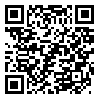Volume 10, Issue 1 (March 2025)
J Environ Health Sustain Dev 2025, 10(1): 2521-2532 |
Back to browse issues page
Ethics code: IR.SBMU.RETECH.REC.1396.1151
Download citation:
BibTeX | RIS | EndNote | Medlars | ProCite | Reference Manager | RefWorks
Send citation to:



BibTeX | RIS | EndNote | Medlars | ProCite | Reference Manager | RefWorks
Send citation to:
Fatehpanah A, Jahangiri K, Seyedin H, Kavousi A, Malekinezhad H, Rostami M. Water Health in Drought: A Model Integrating Indigenous and Modern Knowledge. J Environ Health Sustain Dev 2025; 10 (1) :2521-2532
URL: http://jehsd.ssu.ac.ir/article-1-857-en.html
URL: http://jehsd.ssu.ac.ir/article-1-857-en.html
Azadeh Fatehpanah 

 , Katayoun Jahangiri *
, Katayoun Jahangiri * 

 , Hesam Seyedin
, Hesam Seyedin 

 , Amir Kavousi
, Amir Kavousi 

 , Hossein Malekinezhad
, Hossein Malekinezhad 

 , Masoud Rostami
, Masoud Rostami 




 , Katayoun Jahangiri *
, Katayoun Jahangiri * 

 , Hesam Seyedin
, Hesam Seyedin 

 , Amir Kavousi
, Amir Kavousi 

 , Hossein Malekinezhad
, Hossein Malekinezhad 

 , Masoud Rostami
, Masoud Rostami 


Department of Health in Disasters and Emergencies, School of Public Health and Safety, Shahid Beheshti University of Medical Sciences, Tehran, Iran
Abstract: (908 Views)
Introduction: Drought is a natural hazard that limits access to water and threatens health. This study was conducted to present a combined model of indigenous and modern knowledge to combat the effects of drought on water health.
Materials and Methods: This study was a mixed-method design with four phases. In the first and second phases, the components of indigenous and modern knowledge were obtained through qualitative interviews using content analysis method and literature review using narrative method. In the third phase, components obtained from the two previous phases were sent to relevant field experts for validation using Delphi method. Two rounds of Delphi were conducted until reaching a consensus of views of the elites. The components that obtained a sufficient score were used to design the research model.
Results: The final model consisted of three main components including household water management, community water management, and water health in drought conditions.
Conclusion: Indigenous and modern knowledge are complementary and their integration creates synergy for the health of individuals, provided that they are studied in a principled way and integrated correctly. The present model was designed with a realistic view and considered the role of culture and indigenous knowledge in people's behavior and could be reasonably used by managers in the field of water health, passive defense, and various plannings.
Materials and Methods: This study was a mixed-method design with four phases. In the first and second phases, the components of indigenous and modern knowledge were obtained through qualitative interviews using content analysis method and literature review using narrative method. In the third phase, components obtained from the two previous phases were sent to relevant field experts for validation using Delphi method. Two rounds of Delphi were conducted until reaching a consensus of views of the elites. The components that obtained a sufficient score were used to design the research model.
Results: The final model consisted of three main components including household water management, community water management, and water health in drought conditions.
Conclusion: Indigenous and modern knowledge are complementary and their integration creates synergy for the health of individuals, provided that they are studied in a principled way and integrated correctly. The present model was designed with a realistic view and considered the role of culture and indigenous knowledge in people's behavior and could be reasonably used by managers in the field of water health, passive defense, and various plannings.
Type of Study: Original articles |
Subject:
Health Safety and Environment (HSE)
Received: 2024/12/18 | Accepted: 2025/02/20 | Published: 2025/03/10
Received: 2024/12/18 | Accepted: 2025/02/20 | Published: 2025/03/10
Send email to the article author
| Rights and permissions | |
 |
This work is licensed under a Creative Commons Attribution-NonCommercial 4.0 International License. |




